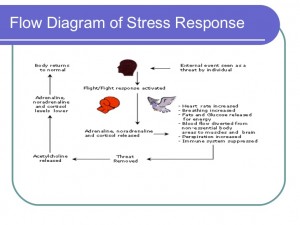It seems that everyone’s day to day life is very busy. As chiropractors we feel the effects of the hectic pace beating through your bodies and, as chiropractors we are concerned with your nervous system. When we check your spine we are looking for a subluxation, which is an area of the spine where fixation is affecting the way your brain is communicating to your body.
So how does this busy mindset and stress affect our nervous system???
Stress is necessary and can be beneficial in order to be productive and motivate us. However the problem arises when stress becomes chronic and a stressor is not removed. It puts us into fight or flight mode which is our stress response being activated. Experiencing multiple stressors concurrently puts us in a chronic stress cycle, which over activates the sympathetic part of our nervous system. The following diagram is a good visual on how this works and its repercussions
Chronic stress means shutting off digestion, growth, reproduction and metabolism, therefore affecting our hormones, eating habits, mental health and weight.
What does chronic stress then start to look like?
- fatigue
- mood swings
- sleep disturbances
- sex hormone imbalances – PMS, menstrual irregularities
- skin issues
- digestive issues
- thyroid problems
- puffy face and central weight gain
- difficulty losing weight
- lowered immunity
Tips to decrease stress:
- A Chiropractic adjustment will help your body adapt to and recover from stress better. Spinal dysfunction impacts the way our brain functions and a study by Dr Heidi Havvik provides solid scientific evidence that adjusting the spine changes brain function. (https://spinalresearch.com.au/research-beyond-doubt-adjusting-subluxated-spine-changes- Â brain-function/)
- Yoga
- walking
- taking a bath once a week
- Exercise
- Meditation – meditation app. eg: 1 Giant Mind
- Nutrition poor nutrition creates stress in the system this is increased by inflammatory foods.
Avoid foods that can increase inflammation in our system:
- Dairy
- Gluten
- Sugar
- Alcohol
- Corn
- Soy
Cravings:
Stress increases our cravings for ‘Palatable foods,’ these are processed, salty, fatty fried, refined sugar foods. Increasing good quality protein and wholegrains over processed and refined sugars helps with blood sugar glucose spikes and consequent insulin spikes.
Avoid ‘reward’ cycle and potential to view these foods as ‘addictive’.
Action tips:
Having high protein snacks available helps you avoid “eating on the run” and opting for unhealthy snacks. e.g.: Tamari seed and nut mix.
Supplement Magnesium is an important mineral for our body to help our nervous system deal with stress. It stabilises blood sugar, energy production and promotes relaxation. To increase magnesium in your system:
- eat green leafy vegies, quinol, and wholegrain
- have an Epsom salts bath
- take a magnesium supplement: consult with your chiropractor or health practitioner as strength of available products vary.
Final Message:
Increasing your self-awareness about stress is crucial. Ask yourself:
- Am I stressed?
- Am I used to that feeling of stress and have i accepted it as my normal?
- How is stress impacting on my health and quality of life?
- Should I be making dealing with my stress a priority?





